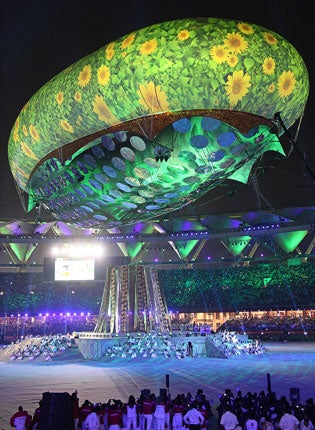Delhi's poorest watch from afar as Games open in dazzling style

In the Jawaharlal Nehru Stadium, the lights were so bright, the effect was literally dazzling. As the Commonwealth Games opened last night in Delhi, drummers drummed, huge puppets danced, and light sabres in the shape of sitars reached into the sky. "I declare the Games open," said Prince Charles. "Let the Games begin," followed India's President, Pratibha Patil. More than 65,000 spectators cheered.
Anthony Peter and his wife, Dolly, watched proceedings by the light of a single, uncovered bulb. In their tiny, two-room house in a slum colony in the south of the city, they had tuned their television to the opening ceremony but they watched without enthusiasm. Just days earlier, officials had come to their community and erected bright blue 8ft screens bearing the Commonwealth Games logo to hide the colony and its impoverished residents from passing traffic. The hoarding that had cut off their colony bore the words: "Come out and play."
"They have done this to hide the poverty so that people cannot see the poor," said Mr Peter, an electrician who works odd jobs to provide for his wife and three children. "We are not going to be able to see any of the Games' events," added his wife. "We have no money for that."
There were two Indias on display last night. In the stadium – where weeks of problems and embarrassment over the Games' shambolic preparations were swept aside by an inspirational opening ceremony directed by the veteran movie producer Shyam Benegal – was the India the establishment wished to display to athletes, spectators and millions of viewers.
It was the India of flair and imagination, of first-class technology and channeled energy, a "rising superpower", in the words of Suresh Kalmadi, the organising committee's chairman and the man widely blamed for the stumbles in preparation, who was booed during his welcoming speech.
This was the India proud of its past, proud of its culture, aware of the value of its people. It was the very best of a country bloated with potential and only the mean-spirited would have suggested that the ceremony was not world-class. Even the athletes from India's arch-rival, Pakistan, earned a rousing, big-hearted reception.
But outside the stadium was the India that did not find a place before the television cameras, whose residents were deemed too unsightly not to be hidden from view by special screens. People like Anthony Peter and his wife. The couple have lived in so-called Coolie Camp colony for more than 10 years. Life there is hard: mains electricity came a couple of years ago, but water still has to be pumped by hand from a shared tap or gathered in buckets from a tanker. Earlier this summer, the authorities used bulldozers to crush the cluster of shacks and simple shops from which many of the community's residents scrabbled a living. People feared the heavy machinery would soon come for their homes.
Perhaps the screens have saved them, some residents suggested, and given them another lease of life. Perhaps if the screens have not been erected, then their homes could have been razed, like those in many other poor communities in the city.
But Mr and Mrs Peter say the Games have done nothing for them. The $6bn (£3.8bn) spent on the event has seen no improvements for their colony. Indeed, such is the level of security that people are afraid to step out beyond the blue barriers while the Games are on for fear police will query their identification cards and force them from the city or lock them up.
"If my husband goes out and can only earn 100 rupees, then we cannot eat a second meal," said Mrs Peter, standing in the tiny cement-floored kitchen of her home, where a tangle of electric wires tumbled from the ceiling. "He can only go out once in the day. Then we have to try and beg some money. And as for the water, since the Games' preparations began, we have had no delivery."
The Games ceremony ended with fireworks and music, songs performed by AR Rahman, best known in the West for his tracks in the film Slumdog Millionaire. It somehow felt cruel to ask whether the people of Coolie Colony knew about film, their lives fixed and centred on their slum. It was their home but also a prison. Asked whether any young people from the community had ever excelled in sport, whether they might be inspired by the opening ceremony that was taking place, one of the Peters' neighbours, a man called Davinder, said: "I have a son who plays cricket. But there is nowhere here for them to play. They cannot even dream of it."
Figures from the games
£1.4bn Current official estimate of the cost of the games. But independent experts say the true outlay will be closer to £4.2bn – 100 times the original projected price tag.
£1.26 Sum that the World Bank estimates more than 800m Indians survive on each day.
40,000 Number of workers involved in preparing Delhi for the Games.
45 Number of workers believed to have died in accidents since construction work began on venues in Delhi.
100 cases of dengue fever reportedly recorded in the Athlete's Village area during the past two months.
100,000 families evicted to smarten Delhi's streets for the games, along with 300,000 vendors, beggars, and rickshaw drivers. There will also be 100,000 police working.
Subscribe to Independent Premium to bookmark this article
Want to bookmark your favourite articles and stories to read or reference later? Start your Independent Premium subscription today.

Join our commenting forum
Join thought-provoking conversations, follow other Independent readers and see their replies